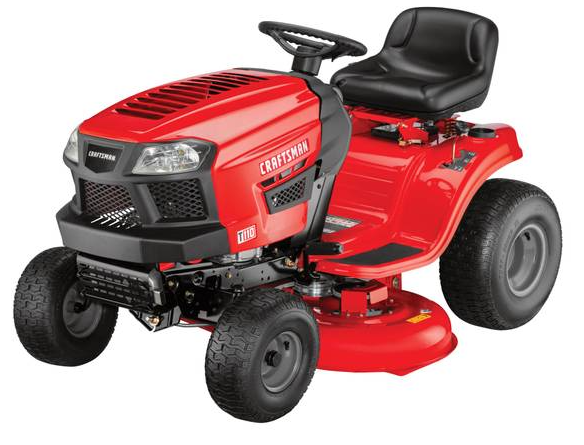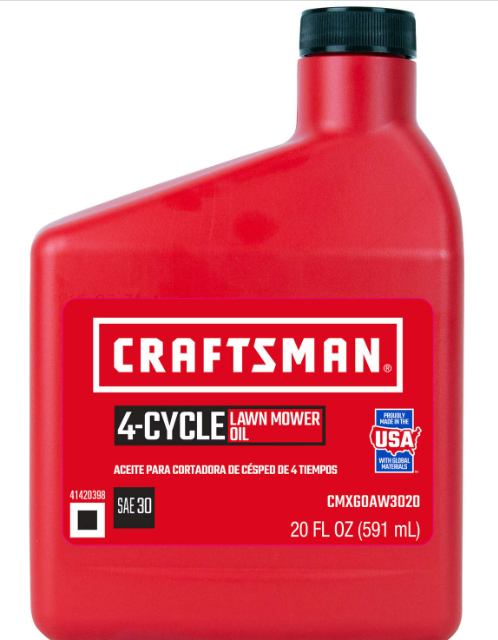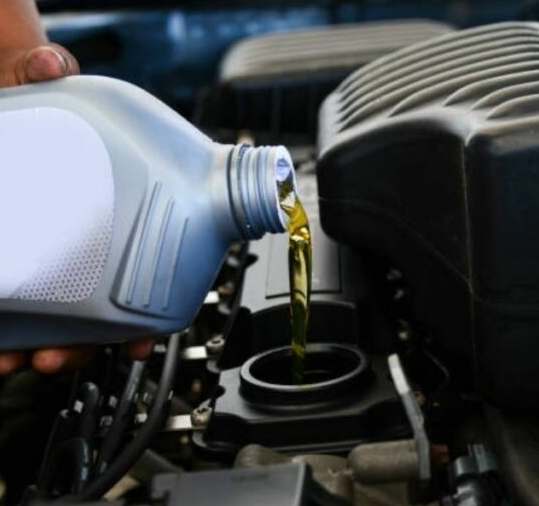Craftsman Mower Transmission Oil Type: Do you own a Craftsman lawnmower? You’ll need to understand the proper type of transmission fluid, capacity, filter, & cost of changing it in order to ensure it runs efficiently.
It is recommended that the transmission fluid for the majority of Craftsman lawnmowers is SAE 80W-90 Gear oil 🚅.
The capacity of transmission fluid for the majority of Craftsman lawnmowers is 2.5 Quarts. it’s best to consult the owner’s manual to find the precise capacity for your particular model 💯.
The filter in the transmission is replaced when the transmission fluid needs to be changed. The filter assists in removing debris and dirt in the transmission’s fluid which helps to prolong the life of the transmission 📖.
The cost for changing the filter and transmission fluid on the Craftsman lawn mower can vary depending on the service and the type of fluid being used. You can expect to spend between $20 to 40 dollars for a basic transmission fluid replacement 💰.

Craftsman Mower Transmission Type
The search results indicate that the recommended oil for Craftsman’s mower transmissions depends on the model. Here are a few examples:
- For climates with consistent temperatures, the most recommended oil for Craftsman mowers is SAE 10W-30. The capacity for this grade of oil is 18-20 Oz.
- The SMART Drive transmission in the Honda HRR216VKA uses regular 10W-30 motor oils, just like those used in some automobiles.
- Craftsman hydrostatic transmission fluid change on requires 15w-50 or a 20w-50 synthetic motor lubricant.
- Lawn Tractor Transaxle Gear Oil, SAE 80W-90, 32-oz (replaces 730229A) 730229B.
You should check your owner’s guide or contact the manufacturer for the right oil type and capacity to use on your Craftsman lawn mower.

Craftsman Mower Oil Capacity
According to the results of the search, the transmission oil capacities for Craftsman lawnmowers vary depending on the model. Here are some examples.
- The most recommended lubricant for Craftsman lawnmowers is SAE 10W-30, with a maximum capacity of 18-20 Oz.
- At each oil change, the 19.5 horsepower lawn tractors require 48 U.S. fluid ounces or 1.5 U.S. quarts of detergent motor oil.
- Craftsman DLT3000 hydrostat tranny uses 10W-50 synthetic engine oil.
- Change the fluid in Craftsman’s hydrostatic transmission using 15w-50 or 20w-50 synthetic engine oil.
- The transmission oil capacity of some Craftsman is approximately 80 ounces.
Craftsman Mower Transmission Filter
Search results are limited in terms of information on the transmission oil filter used by Craftsman lawnmowers. Here are some findings that may be relevant:
- Craftsman 492932S oil filter is compatible with certain Craftsman riding lawnmowers.
- Hydro-Gear Craftsman/Sears Transmission oil filter 182642/142912 Hydro-gear #51563 can installed on some Craftsman lawnmowers.
- RepairClinic.com sells some Craftsman Lawn Mower Transmission filter parts. However, it is unclear which models are compatible.
Check the owner’s guide or contact the manufacturer for the right transmission oil filter to fit your Craftsman lawn mower.
Craftsman Mower Reviews
Craftsman mowers are available in both electric and gas-powered models, which leads to varying reviews based on specific models. Here’s a general overview of Craftsman mowers and user feedback:
Pros:
Affordability: Craftsman mowers are typically competitively priced compared to other brands in the market.
Variety of Options: Craftsman offers a wide selection of mowers catering to different yard sizes and needs. This includes push mowers, self-propelled mowers, electric models, and gas-powered variants.
Ease of Use: Many users find Craftsman mowers easy to operate, featuring straightforward controls and simple assembly processes.
Cons:
Quality Concerns: Some recent Craftsman mowers have drawn criticism for potentially lower quality materials and construction compared to older models.
Maintenance Requirements: Gas-powered Craftsman mowers necessitate regular upkeep such as oil changes and spark plug replacements, which some users find cumbersome.
Battery Life (Electric Mowers): Like many electric mowers, Craftsman electric models may not provide sufficient battery life for very large yards on a single charge.

Craftsman mower transmission oil change
Changing the fluid for your transmission within the engine of your Craftsman lawnmower is an easy procedure, It is essential to follow the proper procedures to avoid damaging the transmission.
Below are some steps for how to change the transmission fluid on the transmission of your Craftsman lawnmowers:
- Place your lawn mower on a level surface.
- Switch off the motor and allow it to cool down.
- Find the drain plug. It’s typically located at the top of the engine.
- Install a drain pan underneath your drain plug.
- Use a wrench to loosen your drain plug.
- Let the transmission fluid that was used in the drainage pan.
- After your old transmission fluid is gone and the drain plug is replaced, you can replace it and tighten it up using an adjustable wrench.
- Find the filler cap for the transmission cap. It’s typically located on the upper part of the gearbox.
- The filler cap must removed.
- Inject new transmission fluid into the transmission. The amount of fluid that you require will depend on the type of lawn mower. It is common to get this information from the owner’s manual.
- Replace the cap that fills the bottle.
- Begin the engine, and let it run for a couple of minutes.
- Verify the level of transmission fluid and add additional fluid, if needed.
It is important to consult your Craftsman Mower’s manual for specific instructions and specifications.
People Also search for craftsman mower transmission oil type
| oil for craftsman lawn mower |
| craftsman lawn mower troubleshooting |
| craftsman push mower oil type |
| craftsman lawn mower oil change |
| craftsman riding mower oil change |
| craftsman lawn mower oil-type |
| craftsman mower oil leak |
| craftsman riding mower oil capacity |
Conclusion
It is important to choose the right transmission oil for your Craftsman mower in order to maintain its performance and lifespan.
By choosing the right oil for your Craftsman, changing it on a regular basis, and using maintenance tips, you will be able to ensure a smooth running mower and prolong its lifespan.
Always consult the owner’s manual and manufacturer’s recommendations for maintenance and transmission oil.
For more posts visit our website: https://engineoiil-capacity.com/
FAQs – Craftsman Mower Transmission Oil Type
What kind of oil does a craftsman lawn mower take?
Craftsman Exclusives, Craftsman, Lawn Mowers, Lawn & Garden 1 Answer from this member: Low oil in the transaxle could cause overheating and loss of drive. That model has a Hydro-Gear 310-0650 transaxle which takes 20W50 motor oil.
Can you use regular motor oil in a riding lawn mower?
Additionally, can you use regular motor oil in a lawn mower? SAE 30 motor oil is commonly recommended for use in a lawn mower engine, but the safest best is to use the type of oil your lawn mower manufacturer recommends. Often 10W-30 or 10W-40, the same motor oil types that are used in vehicles, can also be used in a lawn mower.
Can I use 10W30 oil in my lawn mower?
Often 10W-30 or 10W-40, the same motor oil types that are used in vehicles, can also be used in a lawn mower. With respect to this, can I use 10w30 instead of SAE 30 in my lawn mower?
What kind of oil do I put in my 310 transaxles?
That model has a Hydro-Gear 310-0650 transaxle which takes 20W50 motor oil. Using other oil could cause drive problems or transaxle damage so be sure to use the correct oil only.
What type of transmission oil should I be using for my Craftsman mower?
The recommended transmission oils for Craftsman mowers will vary depending on their specific model. Consult your Craftsman customer service or the manual of your mower to determine what oil is recommended.